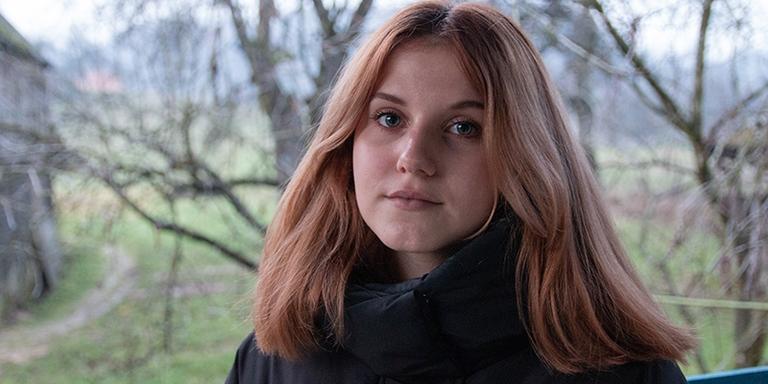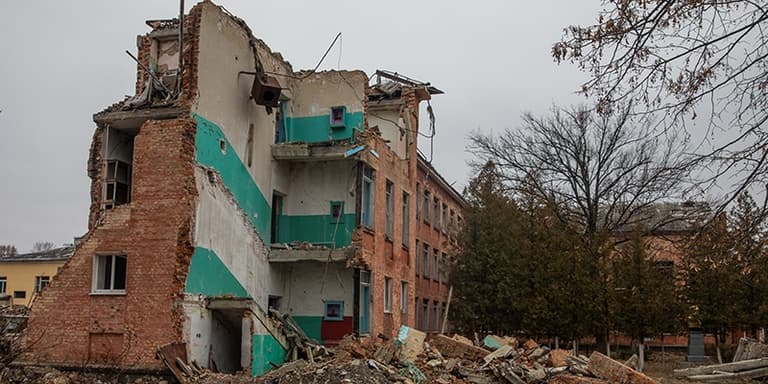A Year In My Life: A Ukrainian Teenager Shares Her Story of Surviving War

Sophia*,16, does her make up in the room she shares with her grandmother in western Ukraine. Sophia enjoys doing make- up as it helps her to calm down. Photo taken on January 16, 2023 by Olena Dudchenko / 91˛Öżâ
For our village in eastern Ukraine, the beginning was on February 17, 2022. I was having physics classes online when we first heard explosions ten kilometres away. They then began to land on nearby streets. Our teacher instructed us to rush to the shelter. When I got to the corridor, I heard a loud explosion. I only managed to sit next to the wall, close my ears, and open my mouth to avoid being shocked by the blast wave. We then dashed to the basement, closing the door only to have fragments fly across the basement, the roof, and the asphalt. I sobbed. It was a typical morning, and here we are.
The shelling continued in the days that followed. On February 21, I awoke to the most powerful explosion. Just a big bang. The birds flew, and then there was silence. It felt like the end of the world. We didn’t have time to go to the basement, so my grandmother and I hid behind two walls.
Later that day, we had a session with a psychologist at the village club when we heard a loud explosion. I realized it was somewhere around my house. I remember everything in bits and pieces: how I got to my yard, how there were no windows in the summer kitchen, how a window in the house completely fell out with all the panes, how I entered my room and saw a small shrapnel piece that had pierced the window and was hanging on curtains.

A close-up photo of Sofia*, 16, standing on the stoop of the house she shares with her grandmother in Western Ukraine after fleeing her village in Eastern Ukraine due to shelling last February.ĚýĚýPhoto taken on January 16, 2023 by Olena Dudchenko / 91˛Öżâ
We then went to hide in the basement of an apartment building. Beds, a stove, and a table had been arranged there since 2014 when hostilities first started in our region. I was in the 2nd grade then. I remember how it was in our village, with tanks firing from our streets. I recall how happy we were as children sitting in the same basement when a lady brought us cooked corn. It was like a game where tanks appeared to be cool. We became accustomed to something flying over us. There was nothing we could do.
But this time I got stronger. I contacted volunteers, and we agreed that they would take me and eight other children out with the parents’ permission. On February 23, we walked around Kharkiv like the happiest children, and we even went to the zoo. However, we heard explosions late at night. “C’mon, it’s Kharkiv, there can’t be any explosions,” I reasoned at first. But then we realized there was shelling going on
From Kharkiv, we drove for nearly five days to western Ukraine to settle in a hostel. I thought I was leaving home for two weeks. I expected everything to be over in a month.
When we arrived here in March, I started to help at a humanitarian aid point by registering people. Shampoo, shower gel, and other necessities were requested. One woman in summer flip-flops was relieved to receive shoes. I realized that people had nothing. I realized I had left on time.
I begged my grandmother, who was staying at home, to leave because I was alone and worried that I wouldn’t be able to handle everything mentally. She has been my main caregiver since I was five. Grandma arrived to me in western Ukraine on April 4. In mid-May, we discovered that only two walls of our house remained. And by now, there is nothing but stones. I spent my entire 16-year life there, and it was all destroyed in a matter of months.

Ruins of a school in Chernihiv, Ukraine. This is one of two completely destroyed schools after missile attacks in the city. Photo taken on January 25, 2023 by Oleksandr Khomenko / 91˛ÖżâĚý
At the end of May, we were told that my father was gone. We didn’t sleep for two days because we were crying. Then, on June 2, my father called to tell that he was fine, although injured and getting treatment in the hospital.
Ěý
The region where I live now is rather safe. I was able to spend the entire summer hanging out with my new friends. I moved with my grandmother from the hostel to a house in July where we now live for free. In the autumn, I began my senior year of high school and will be taking exams to study journalism at a university. I want to get a good education.
However, I am still affected by the war. I haven’t heard anything from my mom in eight months. It would be a huge relief to learn that she is alive and well.
There are also power outages, making communication difficult. One morning I saw some sad news reports from the city where my father now lives. I wanted to check on him, but there was no signal and no power. Situations like this make me sick.
There is also a sense of nostalgia. What if I didn’t sit here right now and instead went for a walk in the park back home? Or else I’d be sitting in my room? We completed its renovation just before the war.
Now I live by the rule “be yourself and do what you like.” If you enjoy drawing, do so. And it appears to me that it will be very useful even during this war. Children who enjoy drawing might become architects who will rebuild everything destroyed by the war.
